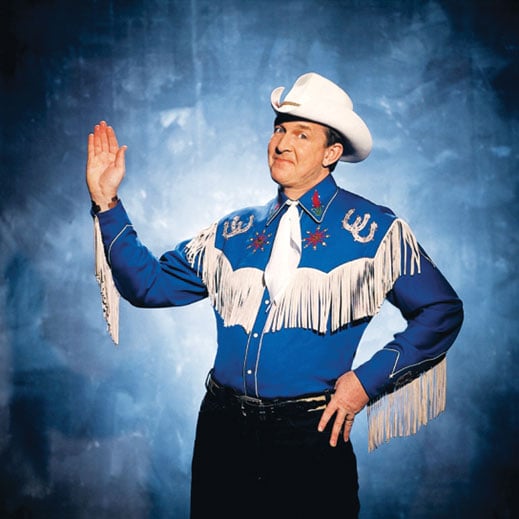Paul Chrisman, PhD ’76 (a.k.a. Woody Paul)
Paul Chrisman has a PhD in nuclear engineering, but he never sought a career in that field. Instead, he made a name for himself as the “King of the Cowboy Fiddlers.”

For more than 35 years, Chrisman—better known as Woody Paul—has been a singer and fiddler for the country western musical group Riders in the Sky. The group has performed more than 6,500 concerts, released 32 albums, and won two Grammy awards, including the 2001 Best Musical Album for Children for a collection of songs inspired by the Woody’s Roundup TV show featured in the film Toy Story 2. In 2012, Paul was inducted into the National Fiddler Hall of Fame.
“I was already on the professional music scene in Nashville when I enrolled at MIT,” he says. “I just loved physics. To this day, I still have a passion for quantum thermodynamics.”
Paul, who grew up outside Nashville, began playing the fiddle at age 11. When he arrived at MIT, he shifted to classical guitar. But after an afternoon of fiddle-playing on Boston Common—which netted him about $75—he switched back.
“Many engineers and physicists are actually great musicians,” he says. “My classmates were phenomenal pianists, bassoonists, and guitarists—but no fiddlers.”
After graduation, Paul had two job offers: an assistant professorship at Columbia University and a recording gig in California. Without much hesitation, he headed west.
“I knew I’d make more money playing rock and roll,” he says. “But I’ve never stopped studying thermodynamics. I’m fascinated with entropy—how it’s present in every reaction on the planet, yet no one can truly describe it.”
While physics and fiddling may seem poles apart as professions, success in both fields hinges on both passion and practice.
“You need a strong work ethic to be successful,” Paul says. “That’s what MIT is all about. The people there love what they do—they get so excited solving a problem. It was a great place to go to school.” Paul still enjoys solving problems. When the Grand Ole Opry was flooded in 2010, he was commissioned to repair and restore the concert hall’s damaged fiddles.
In recent years, the band has reduced its tour schedule to about 125 dates annually, down from more than 200 at its peak. But the Riders—Paul, Ranger Doug, Too Slim, and Joey the Cowpolka King—have no plans to stop playing.
“It’s been fun to look back and realize what we’ve accomplished,” Paul says. “We do this because we love it. If you’re not having fun, you’re doing something wrong.”
Keep Reading
Most Popular
Large language models can do jaw-dropping things. But nobody knows exactly why.
And that's a problem. Figuring it out is one of the biggest scientific puzzles of our time and a crucial step towards controlling more powerful future models.
The problem with plug-in hybrids? Their drivers.
Plug-in hybrids are often sold as a transition to EVs, but new data from Europe shows we’re still underestimating the emissions they produce.
Google DeepMind’s new generative model makes Super Mario–like games from scratch
Genie learns how to control games by watching hours and hours of video. It could help train next-gen robots too.
How scientists traced a mysterious covid case back to six toilets
When wastewater surveillance turns into a hunt for a single infected individual, the ethics get tricky.
Stay connected
Get the latest updates from
MIT Technology Review
Discover special offers, top stories, upcoming events, and more.